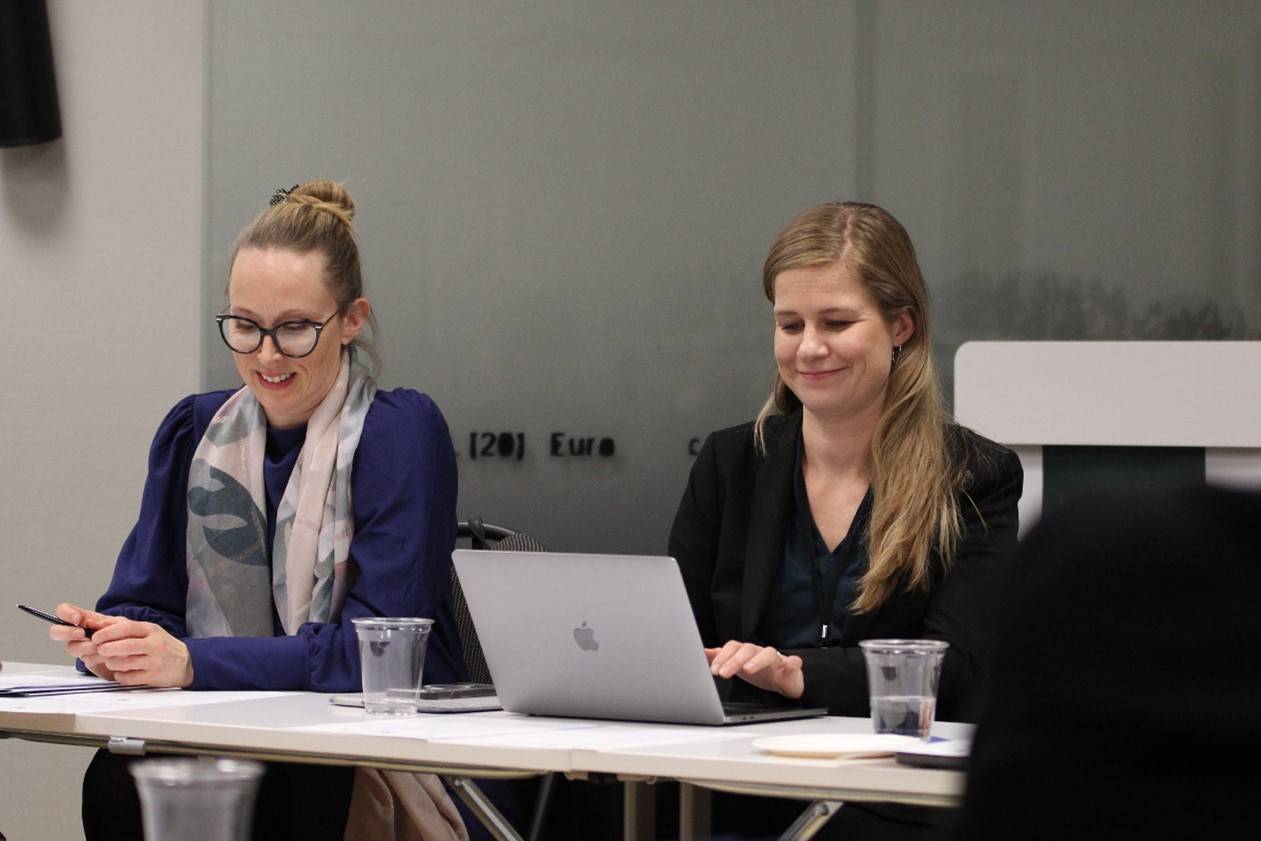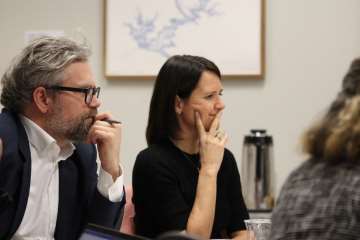
Norway’s term as an elected member of the UN Security Council ended on December 31, 2022, after two intensive years.
Key accomplishments by Norway in the Council were one of the subjects of deliberation in the Norwegian Parliament on 19 January, following Foreign Minister Anniken Huitfeldt’s statement on the country’s membership; a term which saw the coup in Myanmar, armed conflict in Ethiopia, the fall of Kabul in 2021, the Russian invasion of Ukraine in 2022, and the COVID-19 pandemic.
Other processes are also ongoing that analyze how the accomplishments and other lessons learned can be built on in Norway’s future foreign policy. This was the focus of the ninth and final Dialogue Forum for Norway's membership in the United Nations Security Council 2021-2022 on 17 January, which brought together researchers and policymakers in Oslo.
The Dialogue Forum roundtable - 17 January 2023

From left to right: Andreas Løvold (Norwegian MFA) and Trine Heimerback (Norwegian MFA). Photo: NUPI / Therese Leine
The forum roundtable had a forward-looking approach, discussing how the elected period has strengthened the image of Norway as a foreign policy actor and identifying processes and platforms useful for future policy work, such as Afghanistan, Syria and thematic priority areas such as women, peace and security, protection of civilians, and climate, peace and security.
The Dialogue Forum roundtables were organized in collaboration between the Norwegian Ministry of Foreign Affairs (MFA), PRIO and the Norwegian Institute of International Affairs (NUPI). Throughout 2021 and 2022, the roundtables were an arena for strategic discussions between research communities and policymakers, with the aim of expanding the knowledge base and identifying opportunities for Norway in the Security Council. Other roundtable topics included, for instance, the connection between global health and security, UN peace operations, geopolitical dynamics and multilateralism.
The meetings brought together around 80 leading Scandinavian scholars from over 25 research institutions. Meetings were led by the State Secretary of Norway's Foreign Ministry, with active contributions from a broad range of experts and decision-makers from across the Ministry.
**For further reading, below is a selection of PRIO research articles related to the UN Security Council:**
[Obermeier, Anna Marie & Louise Olsson (2022) The UN Security Council and Women’s Full, Equal and Meaningful Participation: Data on Invited Briefers to Council Deliberations, 2015–2021, GPS Policy Brief, 1. Oslo: PRIO.](https://www.prio.org/publications/12971)
[Chang, Patty & Louise Olsson (2023) Women, Peace and Security in Decisions on International Peace and Security: Trajectory and Quality of Integration in UN Security Council Resolutions, 2015–2021, GPS Policy Brief, 2. Oslo: PRIO.](https://www.prio.org/publications/13319)
[Urdal, Henrik & Ida Rødningen (2021) Global helse og sikkerhet – en oversikt over kunnskapsgrunnlaget \[Global Health and Security – an Overview of Academic Knowledge\], Internasjonal politikk 79(4): 461–469.](https://www.prio.org/publications/12902)
[Stai, Nora Kristine & Torunn L. Tryggestad (2022) One Year On: Norway and the Women, Peace and Security Agenda in the UN Security Council, GPS Policy Brief, 4. Oslo: PRIO.](https://www.prio.org/publications/13040)
[Jumbert, Maria Gabrielsen; Kristoffer Lidén; John Karlsrud; Salla Turunen; Astri Suhrke; & Antonio De Lauri (2021) Protection of Civilians – Norway in the Security Council, CMI Report, 2021. Chr. Michelsen Institute.](https://www.prio.org/publications/12699)
**About the Dialogue Forum Secretariat**
The Dialogue Forum Secretariat was responsible for running the forum. It developed the concept and framework for each meeting and coordinated with speakers and participants ahead of the meetings. The discussion of the roundtables followed Chatham House rule of confidentiality to ensure free speech.
The dialogue forum was managed operationally by Vegar Andreassen (MFA), Louise Olsson (PRIO) and Birthe Einen (PRIO), and Niels Nagelhus Schia (NUPI), under the strategic leadership of Andreas Løvold (MFA), Ulf Sverdrup (NUPI) and Henrik Urdal (PRIO).
To read more, click here.





